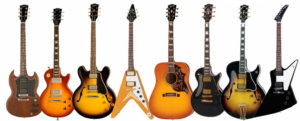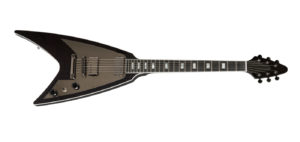You’ve probably already heard about the financial woes Gibson is facing. You don’t even have to be a guitar player, Gibson is such an iconic brand that so many news outlets have been running the story. It’s easy to assume they were making a killing based on the sheer amount of inventory you see at some big retailers. But the reality, as it turns out, is quite different. So, what happened? Why did Gibson find itself in this situation? And what are their options now? Let’s take a look.
As I’m sure you already know, Gibson is one of the biggest, if not the biggest, guitar manufacturer in the world. The company was founded by Orville Gibson, who then sold the company to five businessmen based in Kalamazoo, Michigan when he couldn’t keep up with the demand himself. Over the years, the company was owned by multiple different people and launched a lot of innovative instruments. Of course, the most popular innovations to guitars were the Les Paul in 1952, which in a way is the most successful “signature” guitar, and then the Explorer and Flying V in the ‘60s that have since become iconic. But Gibson engineers came up with more innovations than those. For example, in 1921, Ted McHugh invented the adjustable truss rod, and in 1957 Seth Lover came up with the humbucking pickup. There’s so much to say about the history of Gibson because it covers such a huge date range, but I want to focus on something else on this article so I’ve kept the historical portion brief.
What is important in their history, that is also relevant to their financial situation today, is that current owners Henry Juszkiewicz and David Berryman acquired the company in January of 1986. Juszkiewicz currently serves as CEO, and he has served in that role since the early ‘90s.
It might come as a shock to hear such an established brand having financial issues, but to people who have been paying attention, it wasn’t that shocking. I think it was expected. However, some questions remain. If we saw it coming, how come Gibson didn’t? And if they did, did they really put in place the correct strategy to improve their situation?
Before getting into all of that, I’ve got to write a disclaimer here. I have no affiliation with Gibson or any guitar brand for that matter. This article is neither about defending Gibson nor is it about attacking it. it is about looking at what has happened, why they may have happened, and what Gibson’s options are moving forward. I don’t feel the need to shame Gibson or its CEO like some do, but I’m also not interested in cutting them any slack on things I disagree with. As always, you can check my sources at the end of this article. I don’t like hyperlinking too much because it distracts the reader, but I’ll cite sources in the end.
The reports about Gibson potentially going bankrupt started with an article from the Nashville Post on February 9th. They quoted a senior credit officer from Moody’s as saying Gibson was “running out of time – rapidly”.
It all boils down to money Gibson borrowed a while ago. Gibson owes $375 million in bonds, and a further $145 million in bank loans; in total about $520 million. Both are due by the end of summer… of this year!
Despite changing trends in the market and Gibson’s perceived decline in quality control, the company still sells a lot of products every year. But as you can imagine, sales revenue is not the same thing as profit! According to the Nashville Post, the company makes over $1 billion in sales annually; but that’s only one small part of the picture. Moody’s, which is a credit rating agency, downgraded Gibson’s investment grade to Caa in August of 2017. Wonder how they define a Caa rating? Here’s how they explain it: “Obligations rated Caa are judged to be speculative of poor standing and are subject to very high credit risk.” Ouch.
The reason why Moody’s downgraded Gibson’ rating to Caa is due to what is referred to as Debt/EBITDA ratio. EBITDA here stands for “earnings before interest, tax, depreciation, and amortization.” Essentially, it’s an income figure that takes some expenses into account, but not others like interest, tax, etc. It measures a company’s ability to pay off its debt based on their income. Moody’s argues that it is highly unlikely that Gibson will be able to pay off its debt with its current income level. They reported that the Debt/EBITDA ratio for Gibson was 10, which means that the company’s debt was roughly 10 times more than their income. That is why Gibson was rated at Caa (Caa3 to be precise) and that is why the Nashville Post reported the company was running out of time.
Wait… but how did we get here?
Well, to answer that question you’d have to look at Gibson’s strategy. Gibson, as evidenced by its CEO’s interviews, believes that guitar sales have been declining around the world. There’s a Washington Post story that is widely circulated online that seems to corroborate that point. I’m not so sure about that because most sales numbers are private and therefore cannot be accessed. I don’t think that the guitar market is rapidly shrinking, but since we are talking about Gibson’s strategy, let’s get back to that. Due to their belief about the guitar market, Gibson wanted to hedge some bets. They decided acquisition as their main growth strategy. They’d already done that, with the most popular acquisition being Epiphone in 1957, but Henry Juszkiewicz had a slightly different idea. Since he didn’t see growth in guitars, his acquisition strategy was focused on other areas. They were going to focus on consumer electronics and professional audio equipment. To that end, they’ve acquired brands like Cakewalk, Philips Audio, Onkyo, TEAC, and others. To fund these acquisitions, they borrowed more and more money. They were so adamant about growing outside of the guitar business that on June 11th, 2013, they officially changed their company name from Gibson Guitars Corp. to Gibson Brands, Inc. Needless to say, Gibson hoped that these investments would become profitable – but it’s pretty obvious that things didn’t turn out the way they had hoped.
Here’s the thing. Growing via acquisitions is a legitimate strategy that lots of companies follow. But I’d like to point out a few key items you’d have to consider before jumping to this tactic. One, if you grow too quickly you are more likely to make financial mistakes. Gibson made one acquisition after another without really waiting to see how the integration was going. If you try to grow too fast, you are more likely to lose touch with your customers, get a false sense of security through increasing sales figures, and debt growth will be much larger than income growth! Sound familiar?
Second, let’s assume that guitar sales are declining. I don’t believe this to be true, but let’s say they are. Your first instinct should be to see where the trends in guitars are going, rather than what other industries you should go into. Look at Gibson’s competitors. Do you see anyone else complaining about declining sales? They all make mistakes sometimes, but I can see companies like Schecter, ESP, Jackson, Ibanez, Fender all trying to listen to the consumer to see what they can do with their main product: the guitar! Hell, ESP recently launched their USA production and they were so successful that this year they introduced more guitars that will come out of their USA factory. How’s that for “declining” sales? Schecter has a more diverse line-up in 2018 than any other company as far as I noticed – I don’t see them complaining. Even if we accept the argument that sales are declining, there are always things you can do to remain profitable. Besides, Gibson already has a huge fan base! There are so many people that want to buy Les Pauls and Explorers and Flying Vs… They want what you have been doing for so long. They just expect better quality, which brings me to a new point…
I have only played a handful of Gibsons in my life. I’ve never owned one but tried a few at Guitar Center. I have to be honest, I personally didn’t notice quality control issues when I played them, but I only spent maybe 3-4 minutes with each Gibson I tried at a retailer. But there is one thing I have been noticing a lot in the last few years. The perceived quality of Gibson has gone down in the eyes of players around the world. I watch and read reviews, talk to incredible guitar players and luthiers, and dive into forums and social media groups. I love guitars and I write about music – I have a pulse on what the perception is and there are some people whose opinion I wholeheartedly trust. They all say the same thing. The quality of some of the most expensive Gibson guitars has gone down. Let’s say you don’t believe that. Let’s say that you have a Gibson and you’re happy with it. That’s great, but the point here is that lots of people aren’t happy with what they’ve got! And oftentimes, perception is everything! Your consumers are trying to tell you something. They’re telling you that they can buy a guitar with similar, or better, specs for a much cheaper price; and they’re telling you that they’d probably be happier with the QC if they went with another company. Are you going to listen? Or are you still going to blame declining guitar sales?
Look, I am aware that the Internet has made it possible for a lot of people to jump on bandwagons. Some YouTubers actually made really great points by saying that Gibson usually gets bashed by people online who are just jumping on the latest trend of hating Gibson. I think there’s truth to that. But I also think that you can’t ignore the QC issues that have been pointed out by highly respected players and luthiers. Besides, even if this was just a bandwagon people jumped on (which doesn’t seem likely), a big part of marketing is analyzing your perception. Sometimes how you are perceived by consumers is more important than how you actually are! If quality issues keep coming up, wouldn’t you shape your strategy to make sure these issues are addressed first and foremost? But if you are spending your time with unnecessary acquisitions that put you under even more debt, can you really blame consumers who only wanted a decent Explorer with a quality they’ve come to expect from some of your competitors? I get that people can sometimes be unfair to Gibson, but you know what? Gibson could have done a lot to prevent all this headache, but instead, they chose to focus elsewhere. Can’t really blame the consumer on that one.
Again, acquiring companies outside of guitar isn’t necessarily a bad idea. Diversification of a portfolio is actually a good way to hedge your bets. But you are Gibson! Your flagship product is your guitar. And you have a huge customer list. If your priority is acquiring Philips Audio and Onkyo rather than improving the quality of your guitars and finding a way to bring some costs down, then perhaps you should look at your priorities rather than blaming what’s happening to sales. Another example is that Gibson skipped NAMM this year to only focus on CES, the Consumer Electronics Show, in Las Vegas. There is absolutely nothing wrong with attending CES, especially since they have some brands that are in the consumer electronics area – but how do you justify skipping the largest instrument trade show in the world? Consumer Electronics are great, but your flagship product is the guitar. How do you expect people to still have trust in you when you don’t even show up to tell them what is new? I’m still baffled as to why they skipped NAMM entirely.
And finally, I’ve recently read an interview with Henry Juszkiewicz that sort of put some blame on retailers. He says the retailers are “all afraid of e-commerce” and suggested that the current way of retailing wasn’t as friendly as it used to be, which he says is off putting to consumers. Some people say he makes a good point. I see it a bit differently. First of all, going public with this kind of attack will not please retailers. There are better ways to deal with that. Second, in my experience, if anything the retailers are pushing Gibson to you more than any other brand. Why do you think I’ve had experience in trying out expensive Gibsons – it’s not because I was there to check them out in the first place! So, if anything, retailers like Guitar Center have been super loyal to Gibson. But I don’t know what this interview will do to that. And third, even if we assume that he is right, that still doesn’t explain all the financial trouble Gibson is going through. Can we explain their almost $500M. debt with Juszkiewicz’s argument? Of course not!
Growing via acquiring non-guitar related brands is fine, but you would have to a) keep your focus on your main product and improve its quality, and b) grow slowly so you can make sure your debt doesn’t become too big to manage. Gibson did neither.
In terms of the guitar lines themselves, I think Gibson spent too much time on innovations that tried to solve problems people didn’t have. How many guitarists have you heard that raved about robot tuners? And while they did come up with some cool guitars in the last few years, there were a lot of reported QC issues and guitarists can’t justify spending money on Gibsons when they can buy a guitar with similar or better specs for much cheaper. For example, they recently came up with a different V shape that they call “Modern Flying V”. It kind of looks like a Jackson Roswell. I actually dig the shape, I think it’s a cool guitar. But I would argue that this isn’t the guitar Gibson’s core customer base was looking for. Even if they did, with a price tag around $4,500 I don’t know how much of this you expect to sell. This is what I mean when I say solving problems people don’t have. They want you to solve your QC issues on Les Pauls and other legendary lines and maybe bring some of your costs down. And if you want to explore new guitar shapes, perhaps you’d be better off doing that after improving your brand reputation? Is now really the best time to be doing this?
So, what are their options now?
One option is declaring bankruptcy. That’s where most of the recent headlines came from. If Gibson was to choose this option, depending on the type of bankruptcy, they could either continue day to day operations but all significant decisions would have to be approved by a bankruptcy court, or they would go entirely out of business and a trustee would liquidate all the company’s assets to pay off debt. A second option is re-financing; in other words, they would restructure their existing debt. But it is doubtful that Gibson would get desirable rates from lenders since the financial trust in them isn’t very good at this point. A third option is to sell Gibson to a new owner. Of course, that doesn’t make the debt go away; but it is an option for Juszkiewicz.
According to Billboard, the company is “in the process of arranging a new credit facility to replace the bonds, fully expecting the bonds to be refinanced in the ordinary course of business.”. If this is true, it would signal that the company has chosen to go with the refinancing option. They have also recently sold Cakewalk and are in the process of selling their legendary Nashville facility they’ve been using for a long time.
I will end by saying this: Gibson is an iconic brand and I want them to improve. High tides raise all ships. A strong Gibson that makes great quality guitars wouldn’t just benefit players, it would also raise the whole playing field for manufacturers. I’d love to own a Gibson one day – who doesn’t? So, a scenario in which Gibson disappears is an unpleasant one. I hope that they can work out their financial issues and start focusing on the more important thing: guitars! To that end, I wish Juszkiewicz would sell it to a new owner so we could have a new beginning with someone who understands the market trends better, but alas, I don’t see that happening. And I know Juszkiewicz gets a lot of blame and sometimes it’s unfair. But you know what? If you are the CEO and you’ve made the call to go into areas that never panned out and you continue to alienate your fan base as well as your retailers, what exactly are we supposed to think?
We want to see you thrive, Gibson. Good luck.
Sources & Additional Reading:
- Gibson ‘running out of time – rapidly’ – Nashville Post
- Gibson ‘running out of time – rapidly’ to resolve debt issues, says financial expert
- The Decline of Gibson… What Happened? (YouTube)
- Moody’s – Rating Symbols and Definitions (July 2017)
- Watch Out for the Five Hazards of Growing Too Quickly
- History of Gibson (Gibson Archives)
- Drop the guitar: Gibson Rebrands
- Gibson Guitars: Struggling Company Makes First String of Redundancies
- Bankruptcy: What Happens When Public Companies Go Bankrupt (SEC)
- Gibson CEO Talks Challenges Facing Guitar Retail Industry: ‘These Are Troubled Times’






